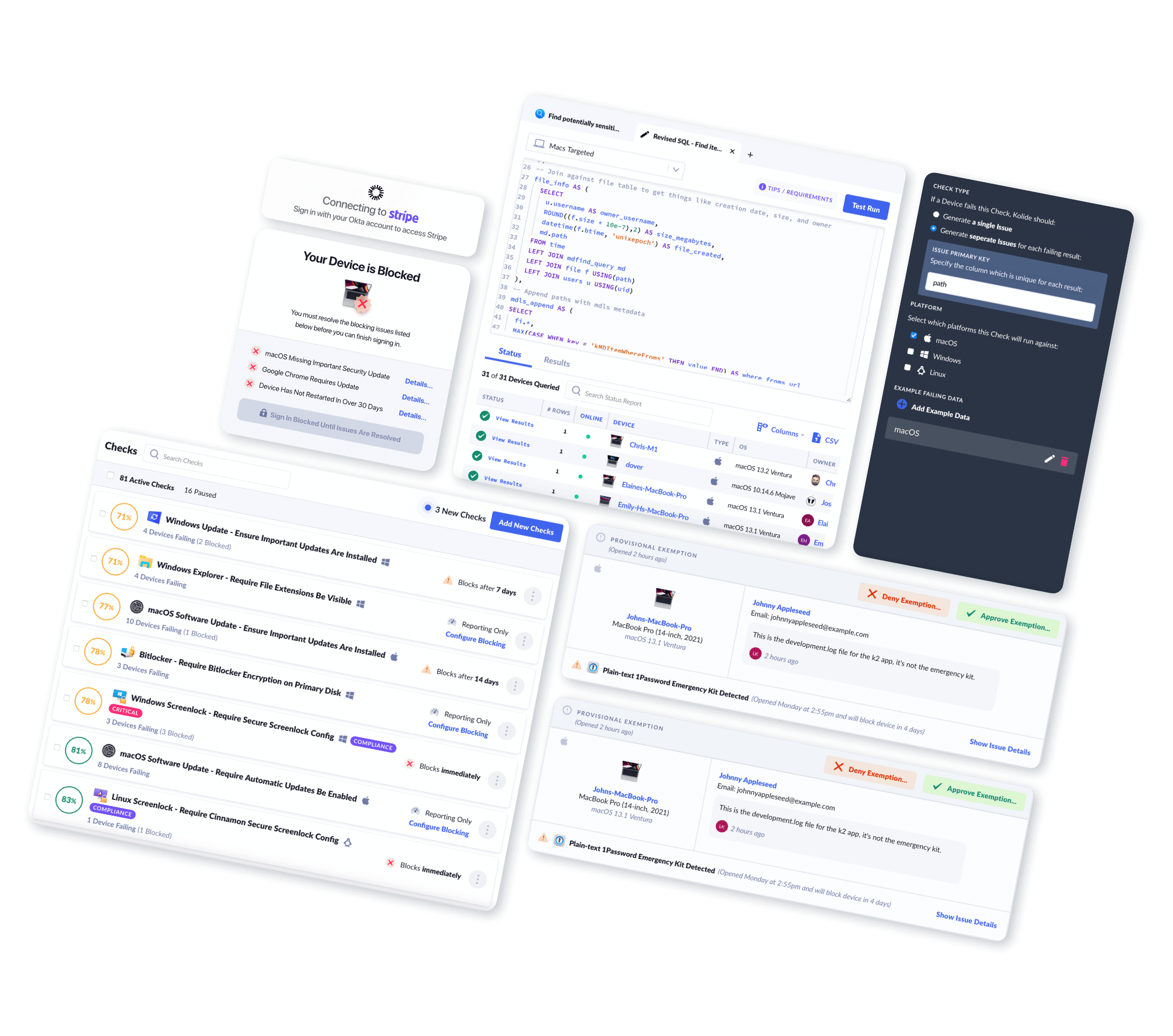How to List DNS Resolvers Across All Mac and Linux Devices
Using Kolide, you can easily view and query DNS Resolvers across your fleet.
Introduction
DNS is the system by which names (like kolide.com) are translated into IP
addresses. DNS resolvers specify which DNS server should be used for different
network addresses. Organizations may want to specify different DNS resolvers
to resolve domain names that may be hosted behind a VPN or otherwise resolvable
by public internet DNS servers.
What DNS Resolver Data Can Kolide Collect?
Kolide's endpoint agent bundles in osquery to efficiently collect DNS Resolvers from Mac and Linux devices in your fleet. Once collected, Kolide will parse, clean up, and centrally store this data in Inventory for your team to view, query, or export via API.
Kolide meticulously documents every piece of data returned so you can understand the results.
DNS Resolvers Schema
| Column | Type | Description | |
|---|---|---|---|
| id | Primary Key |
Unique identifier for the object |
|
| device_id | Foreign Key |
Device associated with the entry |
|
| device_name | Text |
Display name of the device associated with the entry |
|
| address | Text |
Resolver IP/IPv6 address |
|
| netmask | Text |
Address netmask length. When using sortlist, this might look something like |
|
| options | Text |
The binary representaion that is the bit mask containing the bitwise "OR" of the options enabled. Run |
|
| resolver_order | Integer |
Address type index or order |
|
| resolver_type | Enum::Text |
The type of DNS resolver Can be one of the following:
|
|
| collected_at | Timestamp |
Time the row of data was first collected in the database |
|
| updated_at | Timestamp |
Time the row of data was last changed in the database |
|
What Can You Do With This Information?
Kolide enables you to write your own queries against the data the agent collects. This allows you to build your own reports and API endpoints. For example, you can:
SELECT *
FROM device_dns_resolvers
WHERE NOT (
address::inet <<= '192.168.0.0/16' OR
address::inet <<= '10.0.0.0/8' OR
address::inet <<= '127.0.0.0/8' OR
address::inet <<= '172.16.0.0/12'
) AND device_dns_resolvers.resolver_type = 'nameserver';| id | address | netmask | options | device_id | updated_at | device_name | collected_at | resolver_type | resolver_order |
|---|---|---|---|---|---|---|---|---|---|
| 3 | 8.8.8.8 | 32 | 11011000001 | 2 | 2023-12-17T00:26:39.906Z | Jasons-MacBook-Pro-2 | 2023-12-17T00:26:39.906Z | nameserver | 0 |
Why Should I Collect DNS Resolvers?
Collecting DNS resolvers can help IT administrators ensure that computers are correctly configured to successfully access internal or otherwise non-public resources, such as company IRC, database or git servers.
End-User Privacy Consideration
Kolide practices Honest Security. We believe that data should be collected from end-user devices transparently and with privacy in mind.
DNS resolvers are unlikely to contain personal information, unless you have a unique DNS resolver setup for personal or private reasons.
When you use Kolide to list DNS Resolver data from end-user devices, Kolide gives the people using those devices insight into exactly what data is collected, the privacy implications, and who on the IT team can see the data. This all happens in our end-user privacy center which can be accessed directly by employees.
